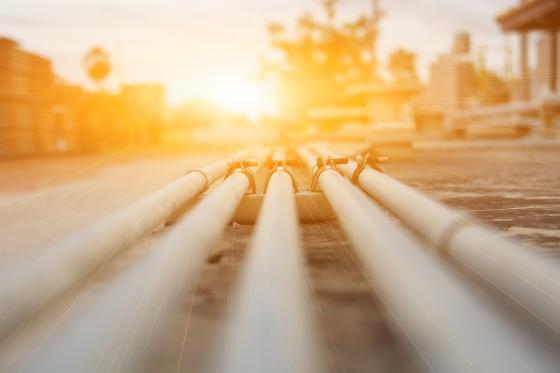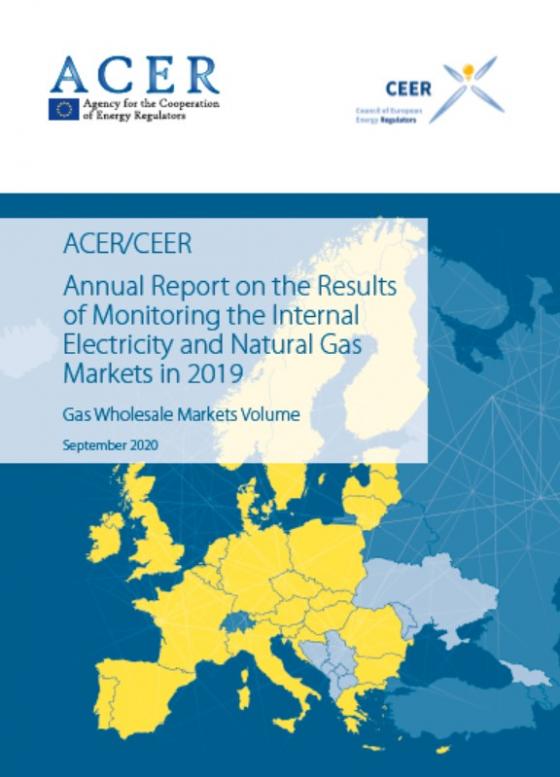ACER finds EU gas market rules successful and recommends decarbonisation to be built on current market design

The new Gas Wholesale Market Volume

Common rules governing gas transportation systems have contributed over the last five years to more competition and better prices in the EU according to the Gas Wholesale Volume of the latest Annual Report on the results of monitoring the internal electricity and natural gas markets (MMR) published today by the European Union Agency for the Cooperation of Energy Regulators (ACER). In this volume the Agency also recommends that any upgrading of rules aimed at decarbonising the gas sector be built on the current EU market design.
This year there will be two other volumes of the MMR analysing the markets in 2019: an Electricity Wholesale market volume and a combined volume including Retail markets and Consumer protection both to be published in mid-October. The MMR is developed in cooperation with the Council of European Energy Regulators (CEER) and increasingly with the Energy Community Secretariat. All volumes will be published here.
The EU gas market rules are working
Gas market monitoring results show that the common rules governing access and operation of EU gas transportation systems – the Gas Network codes - have contributed to high levels of gas price integration between EU Member States, increased supply side competition and helped create liquid wholesale markets over the period of the last five years.
As a result, big gas companies have less market power and more EU gas consumers can benefit from increased competition and lower prices. To safeguard these developments the Agency recommends that the adaptation of Gas Network codes is made more dynamic, so that the market framework can be adjusted in response to evolving market conditions.
The MMR also shows that the presence of increasingly liquid hubs and the large EU regasification and storage capacities are attracting global LNG suppliers to Europe. In an oversupplied market record LNG deliveries arriving from the Middle East, the US and Russia drove down the gas price to record lows in 2019 saving 29 billion euros according to data from the European Commission. Maintaining competition between suppliers from outside of the EU will grow in importance in the coming years as domestic gas production in Member States continues to decrease while gas consumption has been growing in recent years.
Decarbonising together at EU level
New supply of carbon neutral gas could contribute decisively to the EU climate strategy, with the added benefit of further rebalancing the current market power asymmetry between European gas buyers and third-country suppliers. However, monitoring results show that today, carbon neutral gases account for a relatively minor share of EU gas consumption at around 4%, predominantly biogas, which is mostly not injected into the gas grid, and are far from being competitive at current prices.
Given the framework of The European Green Deal, particularly the increasing ambitions for reducing emissions by 2030 as well as the resources that have been earmarked for climate projects as part of the EU recovery plan, the low uptake of carbon neutral gases will need to accelerate. Therefore, the Agency recommends that any upgrading of internal gas market rules aimed at decarbonising the sector be built on foundations of the current market design, so that the transition to carbon neutral gas does not lead to market fragmentation along national borders and keeps the significant benefits for consumers in place.
The data underlying the Market Monitoring Report is available here.
Access the gas wholesale volume.
Impact of COVID-19 pandemic on gas wholesale markets in the EU The analyses in this report are mostly based on data from 2019 and do not yet fully take into account the effects of the COVID-19 pandemic. However, preliminary analysis by the Agency shows that lockdowns which governments had enacted to control the COVID-19 pandemic have resulted in a severe drop of energy consumption throughout the EU. Gas demand, which fell by 8% compared to the previous year up to May 2020, has yet to return to pre-lockdown levels though demand has picked-up since the beginning of the summer. Some trends which had started in 2019 have further accelerated: EU hub prices plummeted to new record lows (in June spot prices on the reference TTF hub in the Netherlands were down by 52% compared to the previous year and 77% lower when compared to June 2018); hub trading activity, supported by additional hedging needs, rose by more than a fifth up to June 2020 compared with the same period last year; and record volumes of gas are being held in storage. |


